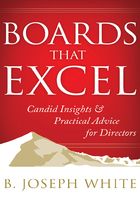
Boards in a Goldfish Bowl
Corporate (and to a lesser degree nonprofit) directors function in a charged environment these days. More than ever, directors are held accountable for performance. Shareholders and stakeholders expect the board to attend to their many, often competing, interests, claims, and concerns.
Boards are under increased surveillance because of highly visible calamities that have befallen some companies. Think Lehman Brothers and General Motors. Over and over, the question has arisen: Where were the boards?
Investors and the public are understandably skeptical about the attentiveness and effectiveness of boards, especially in light of the power, privilege, and rewards their members enjoy. The authors of a recent book titled Money for Nothing: How the Failure of Corporate Boards is Ruining American Business and Costing Us Trillions are unrestrained in their indictment of directors. From inattentiveness to excessive executive compensation, their criticisms are relentless.
are unrestrained in their indictment of directors. From inattentiveness to excessive executive compensation, their criticisms are relentless.
Yet there is no shortage of institutions and individuals setting ground rules for boards, looking over directors' shoulders and advising or urging governance reform. A short list would include traditional parties like Congress, the SEC, and stock exchanges and more recent entries like proxy advisory services and activist investors.
Proxy advisory services such as ISS and Glass Lewis analyze companies' annual proxy statements and governance practices and advise institutional investors on how to vote their shares. Matters include director elections, executive compensation, and various initiatives put forth by management and investors who qualify for proxy access. These services have become quite powerful because their advice is influential on voting outcomes.
Also influential are activist shareholders such as Bill Ackman, Daniel Loeb, Nelson Peltz, and Carl Icahn and the investment vehicles they control. Institutional investors are also a powerful force. They target boards and companies for change, sometimes on their own, sometimes in partnership with activists. The largest of them, such as Blackrock, Calpers, and TIAA-CREF take an interest in governance because their size does not permit them to do the "Wall Street Walk"—that is, sell shares if they disagree with the company. Others, such as union pension funds and religious orders, choose to stand and fight on principle rather than sell and exit.
In short, boards may meet in private, but they live in a goldfish bowl.